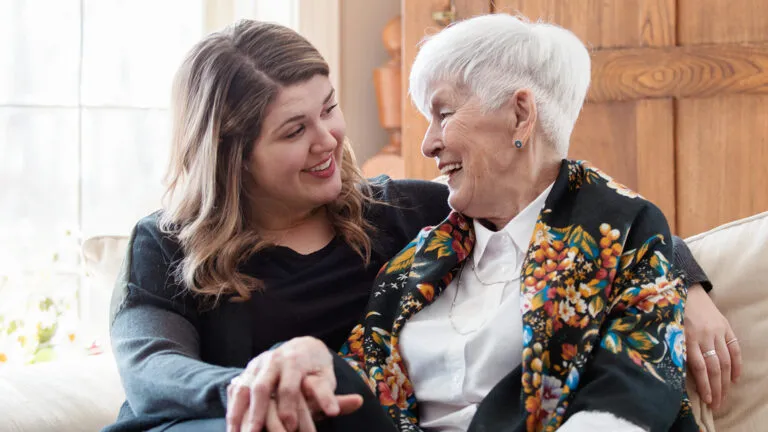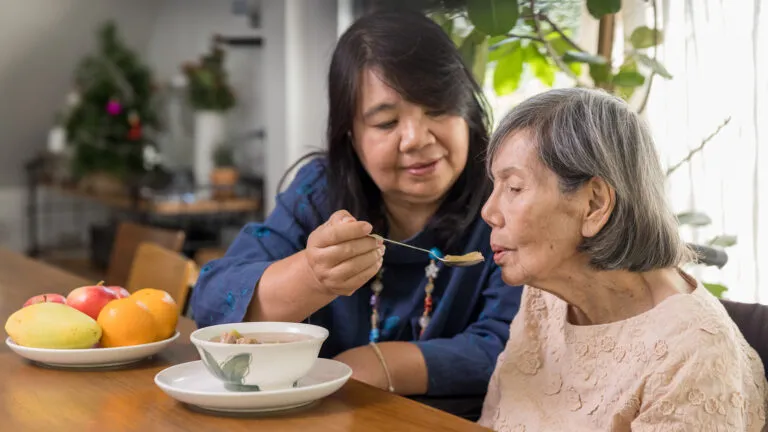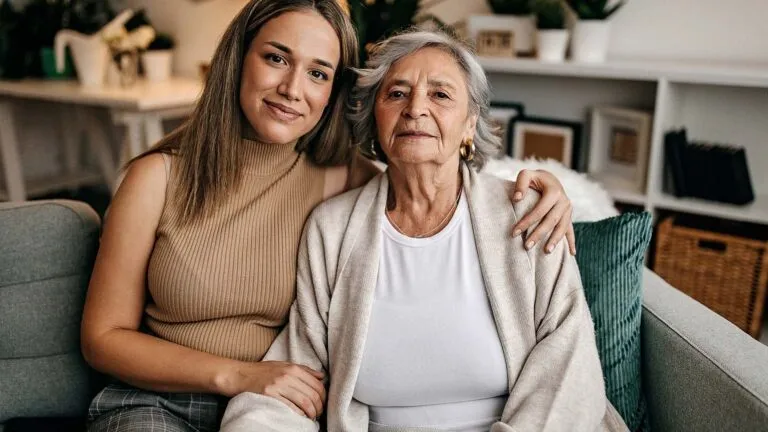Julie Hayes is the Content Manager at Benjamin Rose Institute on Aging.
For months, you have been dealing in multiple ways with the challenges of Covid-19. Winter introduces additional factors into the equation. It ushers in the cold and flu season, while plunging temperatures make it much more difficult for people to gather in outdoor settings. On top of this, restrictions on celebrations have meant a rethinking of how each of us approaches our favorite holiday traditions. This is the time to think carefully about what you can do to help keep your loved one safe from the risks of the season.
It’s important for caregivers of older loved ones to approach these challenges seriously. Older adults remain at the highest risk for contracting and experiencing the severest cases of not only Covid-19, but also colds and flus. It’s true that remaining at home can decrease some of these risks but studies also stress that older adults are at high risk for experiencing negative effects of social isolation, such as depression and anxiety. You may feel that you can’t possibly juggle all you need to do to safeguard your loved one’s health while you keep him or her social and connected. But it’s not impossible.
When you carefully consider the possible challenges, you can be prepared with good strategies to keep both of you safe and healthy. Following are a few steps you can take now as you head into this unprecedented winter:
1.Prepare for scaled-down holiday gatherings
No doubt, you and your loved one have favorite ways of celebrating that you’d love to adhere to this season. But it’s important to consider whether these traditions are safe during the current circumstances. Since March, many family gatherings have become “superspreader events” in which Covid-19 is passed to many people at once.
As a result, we need to be open to Covid-friendly holiday plans. Large gatherings of ten or more people are strongly discouraged for the holidays this year, especially for older adults. If your loved one’s traditional plans include such get-togethers, it’s important to discuss the issue with all involved now and brainstorm on how the gathering can be modified, whether if it’s by inviting fewer people or celebrating virtually.
If you and your loved one do decide to have a small, in-person celebration, don’t forget to:
- Wear a mask if you’ve invited people from outside the home
- Maintain a physical distance from one another
- Wash hands and sanitize, especially after using the restroom, handling food or touching your face
2. Ensure that your loved one’s home is winter-ready
Experts have recommended “hunkering down” for the winter, but in order to do so safely, the living environment has to meet your loved one’s needs. You can make the home winter-ready by:
- Stocking up on his or her prescriptions, as well as over-the-counter cold and flu medications.
- Purchasing nonperishable foods in the event that it’s unsafe for your loved one to go to the grocery store. You may also want to look into grocery delivery services should you need them at some point.
- Checking their house for common winter issues that may cause damage or discomfort during harsh weather.
3. Head off the risks of cold and flu season
Covid-19 isn’t the only danger of the winter season—cold and flu season can also be high risk to older adults due to weakened immune systems. An estimated 70 to 85 percent of annual deaths during the flu season are adults over the age of 65.
The CDC strongly recommends that any older adult who can get a flu vaccine for 2020-2021 should, not only to protect themselves, but to decrease the spread to other vulnerable adults.
Make sure that your loved one washes his or her hands regularly and avoids being near others who have cold and flu symptoms. If your loved one displays any signs or symptoms, contact his or her physician immediately. Because some symptoms are shared with Covid-19 it’s important to identify the source of the issue quickly so that the doctor can administer the appropriate treatment.
4. Create a communication system to keep your loved one connected
For the past several months, your loved one may have been unable to get together in person with those who matter most, like grandchildren and close friends. As winter comes and it becomes harder for people to gather, even for holiday events, it’s more crucial than ever for your loved to stay in touch with others. Doing so helps stave off depression and sadness brought about by social isolation, as well as pandemic stress and the blues that are typically associated with this time of year.
If your loved one is tech savvy, encourage him or her to schedule regular calls with family and friends over their preferred video chat platform. It’s a nice way for them to talk while seeing one another onscreen, as well as to participate in upbeat activities together—singing favorite holiday songs, baking cookies, playing games, etc.
If your loved one has a lower comfort level with technology, you can assist in arranging these sessions or figure out ways to help him or her handle them when you can’t be there. Technology like the Grandpad tablet can help your loved one easily reach family and friends without the complications of regular devices, while many video chatting platforms like Skype and Zoom have accessibility options older loved ones can take advantage of. You can also brighten your loved one’s holiday season by encouraging others in the family to mail letters chock-full of updates, happy memories and photos of beloved pets and grandkids.





